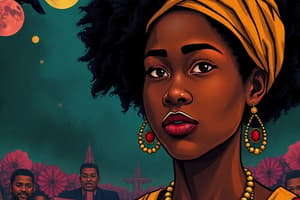Podcast
Questions and Answers
What is the primary consequence of the historical and systemic oppression of African Americans, as described by W.E.B. Du Bois?
What is the primary consequence of the historical and systemic oppression of African Americans, as described by W.E.B. Du Bois?
- An acceptance of racial segregation
- A rejection of white cultural norms
- A sense of unity and collective identity
- A sense of duality and fragmentation (correct)
What is the term coined by W.E.B. Du Bois to describe the racial segregation and discrimination that separates people of color from white people?
What is the term coined by W.E.B. Du Bois to describe the racial segregation and discrimination that separates people of color from white people?
- Color barrier
- Segregation wall
- The color line (correct)
- Racial divide
Which concept recognizes that race is not the only axis of oppression, but rather intersects with other categories such as gender, class, sexuality, and ability?
Which concept recognizes that race is not the only axis of oppression, but rather intersects with other categories such as gender, class, sexuality, and ability?
- Critical race theory
- Intersectionality (correct)
- Racial realism
- Double consciousness
What is the concept developed by critical race theorists to describe the ways in which race is socially constructed and perpetuated?
What is the concept developed by critical race theorists to describe the ways in which race is socially constructed and perpetuated?
Which theoretical framework emerged in the 1980s, building on the work of critical race theorists such as Derrick Bell, Kimberlé Crenshaw, and Richard Delgado?
Which theoretical framework emerged in the 1980s, building on the work of critical race theorists such as Derrick Bell, Kimberlé Crenshaw, and Richard Delgado?
What is the concept developed by W.E.B. Du Bois to describe the internal conflict experienced by African Americans, who are forced to navigate two conflicting identities?
What is the concept developed by W.E.B. Du Bois to describe the internal conflict experienced by African Americans, who are forced to navigate two conflicting identities?
Which concept is an early precursor to intersectionality, highlighting the complexity of black experiences and the need for a more nuanced understanding of oppression?
Which concept is an early precursor to intersectionality, highlighting the complexity of black experiences and the need for a more nuanced understanding of oppression?
What is the concept that argues that whiteness is not a neutral or default category, but rather a specific and privileged identity that is perpetuated through social structures and institutions?
What is the concept that argues that whiteness is not a neutral or default category, but rather a specific and privileged identity that is perpetuated through social structures and institutions?
Which concept describes the ways in which different forms of oppression intersect and intersect?
Which concept describes the ways in which different forms of oppression intersect and intersect?
What is the term used to describe the social, economic, and political barriers that prevent people of color from fully participating in society?
What is the term used to describe the social, economic, and political barriers that prevent people of color from fully participating in society?
Flashcards are hidden until you start studying
Study Notes
Double Consciousness
- Concept introduced by W.E.B. Du Bois in his book "The Souls of Black Folk" (1903)
- Refers to the internal conflict experienced by African Americans, who are forced to navigate two conflicting identities: their own black identity and the dominant white culture
- Du Bois describes it as "twoness" or "two-ness," where individuals are torn between their own cultural heritage and the dominant society's expectations
- Double consciousness is a result of the historical and systemic oppression of African Americans, leading to a sense of duality and fragmentation
Color Line
- Term coined by W.E.B. Du Bois to describe the racial segregation and discrimination that separates people of color from white people
- Refers to the social, economic, and political barriers that prevent people of color from fully participating in society
- Du Bois argued that the color line is a fundamental problem in American society, perpetuating inequality and injustice
- The color line is not only a physical barrier but also a symbolic and ideological one, shaping social attitudes and perceptions
Intersectionality
- Concept developed by critical race theorists, including Kimberlé Crenshaw, to describe how different forms of oppression intersect and intersect
- Intersectionality recognizes that race is not the only axis of oppression, but rather intersects with other categories such as gender, class, sexuality, and ability
- Du Bois' work on double consciousness and the color line laid the groundwork for intersectionality, highlighting the complexity of black experiences and the need for a more nuanced understanding of oppression
Racial Realism
- Concept developed by critical race theorists to describe the ways in which race is socially constructed and perpetuated
- Racial realism argues that racism is a permanent and integral part of American society, rather than a temporary aberration
- Du Bois' work on the color line and double consciousness is an early precursor to racial realism, highlighting the ways in which race is embedded in social structures and institutions
Critical Race Theory
- Theoretical framework that emerged in the 1980s, building on the work of critical race theorists such as Derrick Bell, Kimberlé Crenshaw, and Richard Delgado
- Critical race theory argues that race is a central factor in shaping social relations and institutions, and that racism is a permanent and integral part of American society
- Du Bois' work on the color line, double consciousness, and racial realism is an early precursor to critical race theory, highlighting the need for a more nuanced understanding of race and racism
Theorizing Whiteness
- Concept developed by critical race theorists to describe the ways in which whiteness is constructed and perpetuated as a dominant and normative identity
- Theorizing whiteness argues that whiteness is not a neutral or default category, but rather a specific and privileged identity that is perpetuated through social structures and institutions
- Du Bois' work on the color line and double consciousness can be seen as an early precursor to theorizing whiteness, highlighting the ways in which whiteness is constructed and perpetuated through social and cultural norms.
Studying That Suits You
Use AI to generate personalized quizzes and flashcards to suit your learning preferences.




